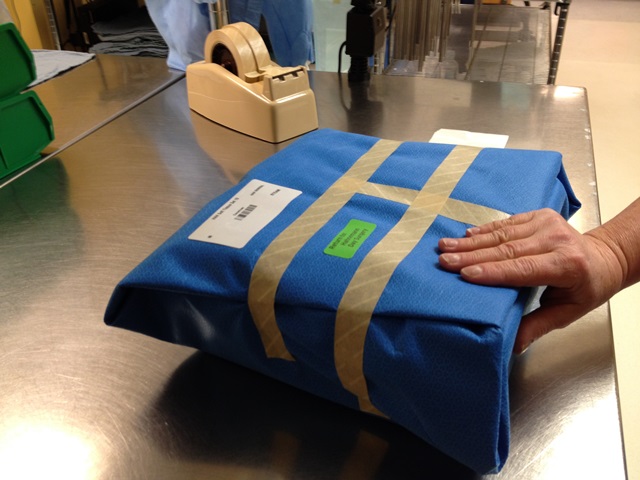Hahnemann Campus Surgery Team Leads on Recycling
It was a simple question of “why not?” that sparked a core group of recycling advocates in the Day Surgery Department at UMass Memorial Medical Center’s Hahnemann Campus to establish a recycling program that is setting an example for other areas of the campus and other surgery units across the medical center.
“There are a lot of people here who are invested in recycling and sustainable practices,” said Kathleen Mondor, director of day surgery on Hahnemann Campus. “Most of us were recycling at home, so we asked ourselves, ‘why not do it here?’”
To answer that question, Mondor and a group of volunteers began meeting more than a year ago. Their goal was to develop ideas that would reduce the use of consumable materials and to start recycling or reusing materials, thereby reducing disposal costs.

A blue-wrapped set of instruments sit ready for surgery at UMass Memorial Medical Center's Hahnemann campus.
With nine operating rooms handling some 8,000 surgical cases a year, day surgery at Hahnemann is a busy place. It uses a lot of single-use supplies and equipment that come well-wrapped to prevent contamination. In general, experts say operating rooms and associated support areas can generate as much as 30 percent of a hospital’s waste stream, and recycling has not historically been part of the process.
“We looked at how we were doing things, to see if there were better ways to manage the flow of materials and processes,” Mondor said.
Ideas were piloted, refined, then adopted across the department. For example, past practice was for each operating room to have its own supply of single-use materials like sterile gloves and other supplies needed for various operations. The team decided to centralize those materials to one area serving multiple operating rooms. The change reduced the total amount of inventory needed on hand and it significantly cut the amount of material that was discarded because of either partial use or expired use-by dates.
A large and highly visible part of the surgical waste stream is the bright blue plastic wrap that seals trays of surgical instruments after sterilization. This so-called “blue wrap” wasn’t being recycled, nor was much of the packaging opened in the operating room just prior to the surgery.
“The concern was always contamination with body fluids,” Mondor said. “So we adjusted our process. Now we collect the blue wrap and other recyclable material before the incision is made, bag it, and remove it from the area.”
Much of the packaging is recycled through E.L. Harvey’s single stream process that was instituted at the medical center last year. The blue wrap, however, takes a different path. Through a partnership with the Seven Hills Foundation, UMass Chan Medical School’s Work Without Limits program, and a start-up company called Blu2Green, the blue wrap is being reprocessed into new products made by people with disabilities. Watch a video to learn more about the program
Over the past year, the implementation of recycling and better materials management has helped the Hahnemann Campus Day Surgery Department divert tons of material from landfills or incinerators and saved thousands of dollars in waste disposal costs.
Mondor credits all the people in the department who embraced the recycling program and helped develop its elements. Two surgeons in particular, resident Mark Albert, MD, and Douglas Rothkopf, MD, who is also a professor of surgery at the medical school, were key leaders, she said. The surgeons are also now studying ways to reduce the number of surgical instruments that need to be prepared for particular cases, thereby reducing the energy used for sterilization and the blue wrap needed to protect them.
“Of course none of this would be possible without our housekeeper Deb Carron and Devin Walmsley, who leads the housekeeping department here. They’ve both been so supportive and committed to the goal,” Mondor said.
Given the success of recycling in the operating rooms, Mondor and the Hahnemann Campus facilities team is now promoting widespread recycling to other areas of that campus. The surgical units at the Medical Center’s Memorial and University campuses are also looking to integrate some of the processes developed by Mondor’s team.
“We’ve gotten people in the mindset that less is more,” Mondor said. “It helps our environment and it can be a significant cost savings.”
